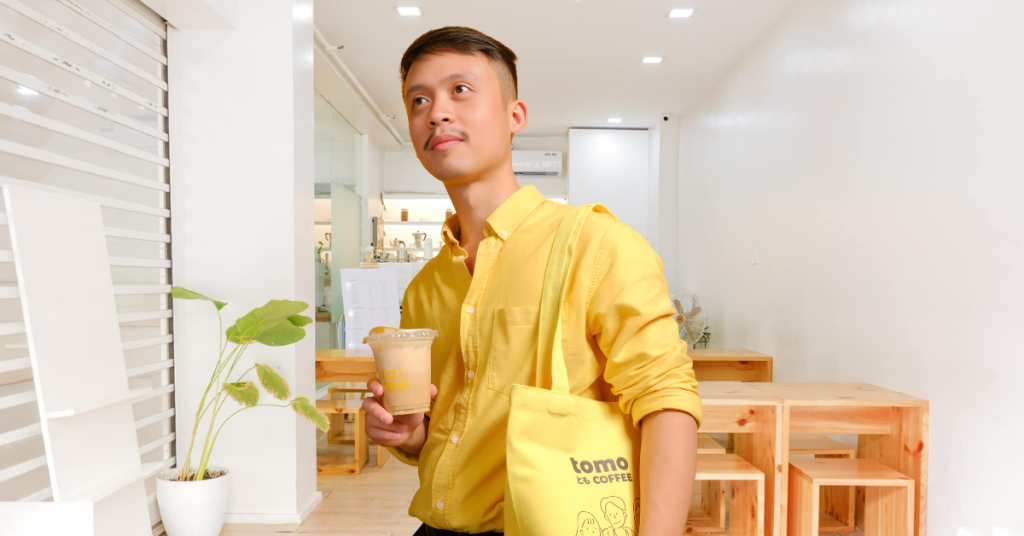When Ryan Llamoso co-founded TOMO Coffee, he wasn’t trying to build a trendy lifestyle brand or cash in on a coffee craze. He just wanted to solve a problem he experienced daily: why was it so hard to find a good cup of coffee that didn’t break the bank?
“Coffee in the Philippines is either too expensive or too low in quality,” Ryan told Financial Adviser PH. “There wasn’t really a middle ground for everyday Filipinos—especially students and young professionals who just want something affordable and reliable.”
He wasn’t a barista. He wasn’t even from the F&B industry. But what Ryan and his co-founder Joy had was vision, grit, and empathy. That was enough to get them started—with no machine, no investor backing, and just a Moka pot in an alleyway.
From Alley to Audience
Joy opened the very first TOMO store beside her house. They started brewing manually and delivering coffee door-to-door to get immediate customer feedback. It was messy, tiring, and personal—every cup was a learning opportunity.
They didn’t have fancy tech either. “Our tools were Google Sheets, Canva, and Messenger,” Ryan said. “What we lacked in resources, we made up for in hustle and care.”
Their secret wasn’t capital. It was community. Joy and Ryan obsessed over every detail of the customer experience: how the coffee tasted, how fast it arrived, how people responded to it on social media. It wasn’t long before TikTok took notice.
Going Viral by Staying Real
The turning point came when they opened their fifth store. Without paying influencers or launching ad campaigns, TOMO suddenly went viral on TikTok. Customers started sharing their experience online. One post led to another, and suddenly, TOMO became a staple in the daily routines of young Filipinos.
“That’s when we knew we were onto something,” Ryan recalled. “People weren’t just buying coffee. They were connecting with the brand.”
Today, TOMO has 40 stores and counting. But the energy remains the same: simple, grounded, and customer-first. Ryan still visits stores regularly, talks to customers, and tweaks the systems.
Lessons from the Ground
Ryan may have exited a proptech startup before TOMO, but the leap into food and beverage came with fresh challenges. The biggest one? Operations.
“In tech, you can scale quickly with code. But in F&B, it’s about people and processes. Every store is its own ecosystem. You need systems, training, and culture.”
They made mistakes. Lease negotiations fell through. There were inventory issues, hiring gaps, and days with no sales. But every failure helped tighten the playbook. They learned when to push and when to pause. When to say yes to growth—and when to get the basics right first.
“Scaling isn’t just about adding stores,” Ryan said. “It’s about building a repeatable experience. You need to scale your culture, your quality, your feedback loop.”
That culture is something Ryan doesn’t outsource. New hires are trained not just in coffee, but in the mission. Every TOMO team member knows why the brand exists and who they’re serving.
The Value of Purpose Over Perfection
What sets TOMO apart is not the beans or the branding—though those are solid. It’s the emotional accessibility. TOMO feels like a friend. It’s a brand that doesn’t talk down to its customers. It invites them in.
The name itself, inspired by the Japanese word for “friend,” reflects that spirit. And it’s a spirit that Ryan insists on keeping, even as they grow.
“We don’t pretend to be third wave or premium,” he explained. “We’re for everyday people. Our job is to make their day better, not complicate it.”
Even today, some TOMO stores still use Moka pots—a nod to their origin story and a sign that quality doesn’t always mean expensive machines or elite baristas. It means care.
Advice to Aspiring Founders
Ryan has advice for anyone looking to build something from the ground up, especially without deep industry connections or capital:
“Start small. Listen every day. Learn fast. Don’t wait for the perfect moment. Just begin.”
That ethos has powered TOMO from one alleyway store to a fast-growing chain with a loyal customer base. But Ryan isn’t chasing unicorn status. He’s building sustainability.
“It’s not about explosive growth. It’s about building a brand that people can trust, that lasts.”
Final Brew
TOMO Coffee is more than a business. It’s a reminder that you don’t need a resume stacked with credentials, a deck full of investors, or a background in the field to start something meaningful.
What you do need is what Ryan and Joy had: a clear problem to solve, a community-first mindset, and the humility to learn as you go.
No barista training. No big capital. Just purpose. And sometimes, that’s more than enough.
![]()



